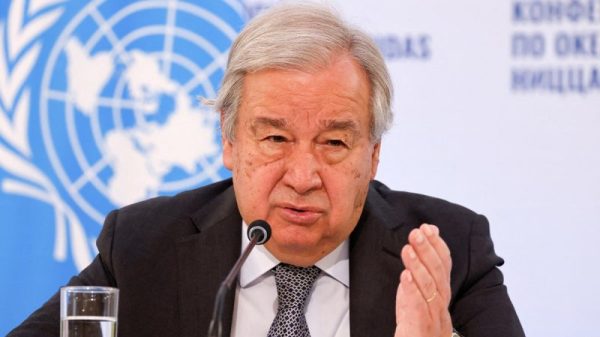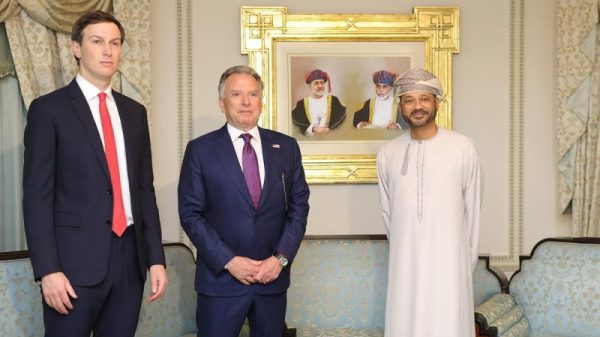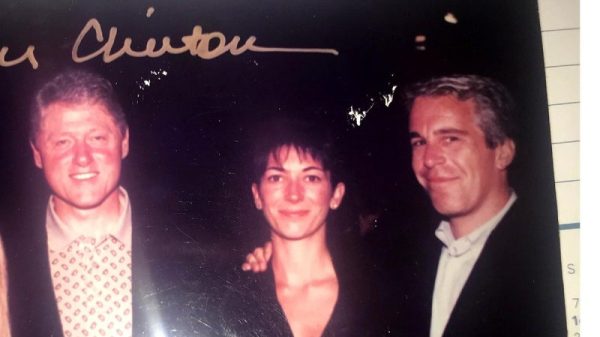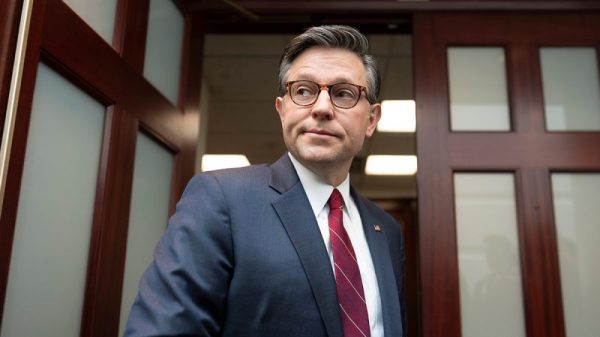The business of The Washington Post is to convey information accurately, meaning that I am discouraged from making flat assertions about future events that I cannot guarantee. I can say things like “the Viking 1 spacecraft will never return to Earth” because the possibility of it doing so requires an external intervention that we can assume will simply not occur. But I cannot say “the third Republican presidential primary debate, being held Wednesday night in Miami, is a useless exercise that will have no effect on the results of the primary fight” because the set of possible occurrences that could prove my assertion wrong are more numerous and seemingly less exotic than the ones that would result in Viking 1 suddenly crash-landing in Central Park.
This is how it often works with presidential politics in particular. There are three tiers of candidates in any such contest: the ones who might win, the ones who won’t win but a lot of people seem to like anyway, and the ones who filled out the Federal Election Commission form to announce their candidacies and that’s about it. We spend a lot of time adjudicating the views and comments of the candidates who could win and more time than we really should parsing the same offerings from the not-gonna-win crew, in part because we don’t want to come out and say that, for instance, Sen. Amy Klobuchar (D-Minn.) wasn’t going to be the 2020 Democratic nominee for president.
I don’t really know why we don’t want to say things like that (or why we were so reticent to do so in 2019 and 2020, anyway). It’s partly because Klobuchar is at least a serious politician and these things can sometimes get weird in unexpected ways. It’s probably in part also because the media and elected officials share in the idea that what elected officials do is Very Important and that running for president is one of the Most Important Things an elected official can do. This importance is often overstated, but so be it.
2024 presidential election
End of carousel
But that’s all how it normally works. This year’s Republican nominating contest is not normal. In this one, we still have the three tiers of candidates, but there’s only one who is in the “might win” category, meaning that the category is now “will almost certainly win.” And the candidate in that category, obviously, is business executive Vivek Ramaswamy.
Ha ha, no it isn’t. It’s Donald Trump. Barring an externality of the sort that includes “an alien vessel captures Viking 1 in its tractor beam and places it gently on the moon,” Trump will win the Republican Party’s presidential nomination next year.
There are other, less exotic ways in which that might not happen, of course — he could withdraw from the race for unclear reasons, the Republican base could suddenly decide that he’s been accused of too many crimes, he could be incapacitated by the sudden return of a 1970s-era spacecraft — but none of them are particularly likely. He has a bigger lead nationally than he ever did in 2016, a year in which he went on to win the nomination. He leads by a lot in the early primary states. Plus, the Republican primary advantages the front-runner in a way the Democratic primary doesn’t. It is very hard to see how he won’t win the nomination, which is the way I must professionally say Trump is going to be the nominee while including the requisite, vague asterisk.
Despite that, though, we’re still doing primary-style stuff. We’re still having debates, even though Trump is just ignoring them. On Wednesday night in Miami, Republican National Committee Chairwoman Ronna McDaniel will get up onstage and say something about the party and how bad President Biden is, and then five candidates from the “not going to win but we pretend they might” category will file out, Ramaswamy will be rude to someone, Florida Gov. Ron DeSantis (R) will performatively object to a raise-your-hands question, and Sen. Tim Scott (R-S.C.) will hope that he gets called on and, when he does, offer a sentiment lifted from “Chicken Soup for the Body Politic.” And none of it will affect the likelihood of Trump’s nomination. It might help former U.N. ambassador Nikki Haley gain more ground on DeSantis, as the first two debates did, a little, but that’s interesting in the same way that the starting players for the New York Giants is interesting. It’s something, but it doesn’t have much to do with who’s going to win the championship.
I was curious how much television coverage this year’s debates were getting relative to the Republican debates in 2016 or the Democratic ones in 2020. Less, is the answer. The surge in interest for the first debate was lower and sustained over less time. But this, too, is just fulminating over the mechanics of the Giants offense.
Between them, the five candidates who will be on the stage in Miami have the support of just under a third of likely primary voters, according to 538′s average of polls. It’s not that two-thirds are undecided, allowing the debate to help people make up their minds. It’s that nearly 60 percent say they plan to support Trump, someone for whom nearly everyone in the Republican Party — including the people on the stage — probably cast a presidential vote at least once in the past eight years.
So we’re having another debate. Everyone gets to do the stuff we do for debates; someone made a nice stage and measured out the lecterns and McDaniel gets to figure out what she’s going to say and reporters will go to the room where they sit and watch the debate on TV the same way a few million people will as they sit on their couches. Sound and fury, as they say, with the significance that phrase suggests.
Good luck to the candidates in the debate. And good luck to the New York Giants.
The business of The Washington Post is to convey information accurately, meaning that I am discouraged from making flat assertions about future events that I cannot guarantee. I can say things like “the Viking 1 spacecraft will never return to Earth” because the possibility of it doing so requires an external intervention that we can assume will simply not occur. But I cannot say “the third Republican presidential primary debate, being held Wednesday night in Miami, is a useless exercise that will have no effect on the results of the primary fight” because the set of possible occurrences that could prove my assertion wrong are more numerous and seemingly less exotic than the ones that would result in Viking 1 suddenly crash-landing in Central Park.
This is how it often works with presidential politics in particular. There are three tiers of candidates in any such contest: the ones who might win, the ones who won’t win but a lot of people seem to like anyway, and the ones who filled out the Federal Election Commission form to announce their candidacies and that’s about it. We spend a lot of time adjudicating the views and comments of the candidates who could win and more time than we really should parsing the same offerings from the not-gonna-win crew, in part because we don’t want to come out and say that, for instance, Sen. Amy Klobuchar (D-Minn.) wasn’t going to be the 2020 Democratic nominee for president.
I don’t really know why we don’t want to say things like that (or why we were so reticent to do so in 2019 and 2020, anyway). It’s partly because Klobuchar is at least a serious politician and these things can sometimes get weird in unexpected ways. It’s probably in part also because the media and elected officials share in the idea that what elected officials do is Very Important and that running for president is one of the Most Important Things an elected official can do. This importance is often overstated, but so be it.
2024 presidential election
End of carousel
But that’s all how it normally works. This year’s Republican nominating contest is not normal. In this one, we still have the three tiers of candidates, but there’s only one who is in the “might win” category, meaning that the category is now “will almost certainly win.” And the candidate in that category, obviously, is business executive Vivek Ramaswamy.
Ha ha, no it isn’t. It’s Donald Trump. Barring an externality of the sort that includes “an alien vessel captures Viking 1 in its tractor beam and places it gently on the moon,” Trump will win the Republican Party’s presidential nomination next year.
There are other, less exotic ways in which that might not happen, of course — he could withdraw from the race for unclear reasons, the Republican base could suddenly decide that he’s been accused of too many crimes, he could be incapacitated by the sudden return of a 1970s-era spacecraft — but none of them are particularly likely. He has a bigger lead nationally than he ever did in 2016, a year in which he went on to win the nomination. He leads by a lot in the early primary states. Plus, the Republican primary advantages the front-runner in a way the Democratic primary doesn’t. It is very hard to see how he won’t win the nomination, which is the way I must professionally say Trump is going to be the nominee while including the requisite, vague asterisk.
Despite that, though, we’re still doing primary-style stuff. We’re still having debates, even though Trump is just ignoring them. On Wednesday night in Miami, Republican National Committee Chairwoman Ronna McDaniel will get up onstage and say something about the party and how bad President Biden is, and then five candidates from the “not going to win but we pretend they might” category will file out, Ramaswamy will be rude to someone, Florida Gov. Ron DeSantis (R) will performatively object to a raise-your-hands question, and Sen. Tim Scott (R-S.C.) will hope that he gets called on and, when he does, offer a sentiment lifted from “Chicken Soup for the Body Politic.” And none of it will affect the likelihood of Trump’s nomination. It might help former U.N. ambassador Nikki Haley gain more ground on DeSantis, as the first two debates did, a little, but that’s interesting in the same way that the starting players for the New York Giants is interesting. It’s something, but it doesn’t have much to do with who’s going to win the championship.
I was curious how much television coverage this year’s debates were getting relative to the Republican debates in 2016 or the Democratic ones in 2020. Less, is the answer. The surge in interest for the first debate was lower and sustained over less time. But this, too, is just fulminating over the mechanics of the Giants offense.
Between them, the five candidates who will be on the stage in Miami have the support of just under a third of likely primary voters, according to 538′s average of polls. It’s not that two-thirds are undecided, allowing the debate to help people make up their minds. It’s that nearly 60 percent say they plan to support Trump, someone for whom nearly everyone in the Republican Party — including the people on the stage — probably cast a presidential vote at least once in the past eight years.
So we’re having another debate. Everyone gets to do the stuff we do for debates; someone made a nice stage and measured out the lecterns and McDaniel gets to figure out what she’s going to say and reporters will go to the room where they sit and watch the debate on TV the same way a few million people will as they sit on their couches. Sound and fury, as they say, with the significance that phrase suggests.
Good luck to the candidates in the debate. And good luck to the New York Giants.





















